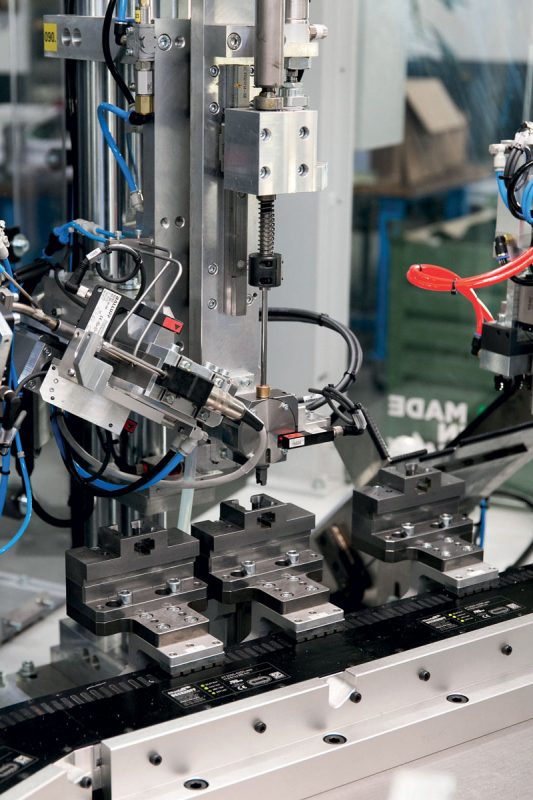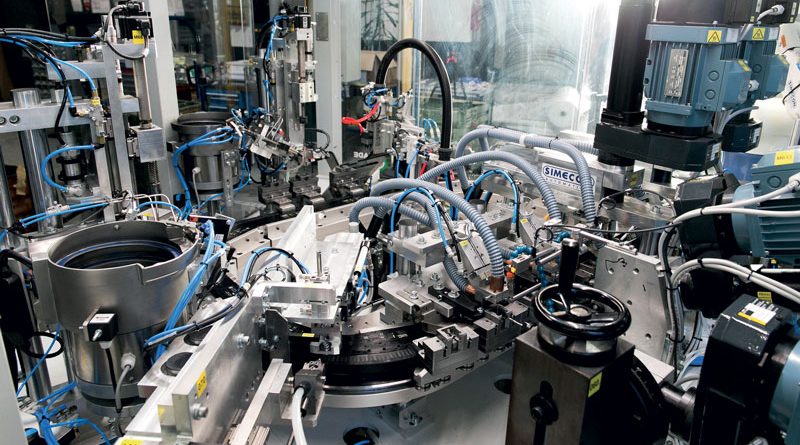Assembly in partnership
KLAIN robotics supplied a DENSO robot and a Roba Engineering feeding system to the Lombardy-based company Simecon Automation to build the HFMS series assembly machine, ideal when there is a need to assemble different types of products, particularly small components. The machine consists of several flexible work stations, designed to reduce working time.
How does a fruitful and lasting partnership come about? Certainly by sharing intentions, passions and values. These are the foundations which characterize the alliance between Simecon Automation and KLAIN robotics, which has now been in place for ten years. Just like KLAIN robotics, Simecon Automation also stands out for its passion for its work, which has been employed for years to design and develop customer-specific solutions.
Over the years, Simecon Automation has dedicated human and technological resources to the creation of a competitive corporate structure capable of creating and designing cutting-edge machinery, standing out in the construction of plants for the assembly of products in the consumer, plastic, automotive, electromechanical, electronic, household appliance, apparel, furniture and packaging sectors. Backed by its know-how in the field of automatic machines, Simecon Automation has developed HFMS (High Flexible Manufacturing System), a very flexible and high-performance assembly machine with the ability of automatically manufacturing different products. This type of machine is now very popular and everything revolves around the key principle of flexibility and the ability to respond immediately to product variations and/or process sequences. From an initial 3D simulation, carried out by KLAIN robotics’ technical department, it was soon possible to define which solution was certainly the most suitable for Simecon Automation’s project.

The HFMS machine is an innovative system for the assembly of small components. 
Multiple product models can be handled on the same machine with smaller batches.
Ten processable models
At the heart of the HFMS assembly machine is the VS-6556 robot from the DENSO range and the Eyefeeder 1000 series flexible feeding system from the Dutch company Roba Engineering, both supplied by KLAIN robotics. The DENSO robot, with a 653 mm stroke and a 7 kg payload, and the flexible feeding system are coordinated by a robot vision guide system with very quick and easy model change programming, to best adapt to any type of production.
The HFMS assembly machine comprises a series of work stations, fed by a pallet line with linear axes, which allows the passage of parts between the various stations in a very short time, thanks to the high speed at which it moves and allows multi-positioning under the same station and/or between the various models to be processed. In addition to the robotic loading station and the pallet line, the individual work stations have also been designed to be flexible and drastically reduce work changeover times, for example the grain feeding and tightening stations. The latter has the capacity to process ten grain models of different types and sizes. In detail, a vibrating unit carries out a pre-orientation, a CNC rotating drawer with an integrated linear potentiometer recognizes the orientation and subsequently a screwdriver with torque control tightens the grain on the component.

The HFMS assembly machine comprises a series of work stations, fed by a pallet line with linear axes. 
The DENSO robot model VS-6556 has a 653 mm stroke and a 7 kg payload.
Ideal for the assembly of small components
The machine handles small metal parts through a pick and place application. The Eyefeeder 1000 flexible feeding system, with its shaking and jolting movements, prepares the parts in the best position for the DENSO VS-6556 robot to easily pick them up, guided by the vision system. The robot deposits the previously picked component on the pallet, which is then directed to the next station. The machine is an innovative system for the assembly of small components: each module can carry out one operation and handle products of different types and sizes. Modules can also be added on the same line to perform a variety of operations: welding, handling, assembly of all kinds, and so on, depending on the customer’s needs. Taking advantage of the flexibility of the handling system and the robotic loading system, the customer is offered the possibility of managing several product models on the same machine with smaller batches, saving on warehouse costs and machine set-up times: a system based on efficiency, which also focuses sharply on costs and with the aim of increasing productivity, without losing sight of the final quality of the product.

